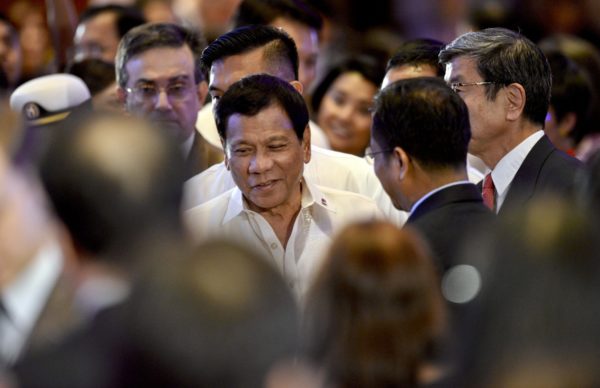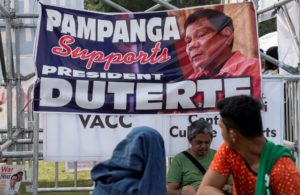Duterte plays a winning hand with foreign policy, but will his luck run out?
March 30, 2017 · By Asia & Pacific for www.washingtonpost.com

Philippine President Rodrigo Duterte, center, attends the Asian Development Bank’s 50th anniversary reception in Manila in February. (Veejay Villafranca/Bloomberg News)
MANILA — Rodrigo Duterte does not need your money. But he will take it.
Since his electoral triumph last summer, the man famous for cursing foreign leaders and calling for mass killing seems to be raking in the cash for Manila. A tidy $24 billion in deals with China. Fresh billions from Japan. Not to mention the tens of millions in military and development aid the United States sends each year — despite his call for a “separation.”
Indeed, eight months into his tenure, with President Trump in power and Asian affairs in flux, Duterte’s devil-may-care diplomacy and relentless talk of “slaughter” seem to be paying off, propping up his domestic popularity even as an International Criminal Court prosecutor warns of a possible war crimes investigation against him.
Courting the president of the Philippines are new friends such as China, which last week sent a vice premier to Duterte’s home town, and Russia, which recently dispatched two warships to Manila on a goodwill visit. Both see Duterte as an ally against the U.S. military’s Asian ambitions.
Old partners such as the United States and Japan might bristle at Duterte’s rhetoric and rights record, but they are willing to speak softly because they need his help countering Chinese claims to most of the South China Sea.

Duterte supporters attend an overnight vigil to demonstrate backing for his drug crackdown in Manila. (Noel Celis/AFP/Getty Images)
Duterte, meanwhile, seems happy to flirt with his various suitors, alternating between swearing and sweet talk, backtracking as required.
As a presidential candidate, the longtime mayor of Davao City promised Filipinos an “independent” foreign policy, vowing to stand up to the Americans and make money from everyone else. With deals and dignitaries streaming in, Duterte can credibly say he delivered — at least for now.
But much of the Philippines prefers the United States to China; Duterte may want to align himself with Beijing’s “ideological flow,” as he put it, but swaths of the country’s establishment do not.
Duterte’s defense secretary, Maj. Gen. Delfin Lorenzana, recently expressed concern about Chinese survey ships lingering in waters off the Philippine coast. Faced with questions from reporters, Duterte seemed confused; he eventually asserted that he would ask the military to tell Beijing to back off — but in a friendly way.
There is a growing sense that his foreign policy is a short-term fix, said Herman Kraft, a political scientist at the University of the Philippines. “We have a tiny window when we can still play both sides.”
Duterte has a flair for the dramatic, and his entrance to the foreign policy stage was nothing short of spectacular.
Casting insults at President Barack Obama, he made a show about finding new “best friends” in Moscow and Beijing — although his calls to curtail the decades-old U.S.-Philippine military partnership were quickly played down by members of his own cabinet.
China, seeing an opportunity to curry favor with a key U.S. ally, invited him to the Chinese capital, where he signed billions in deals. Duterte thanked his hosts by railing against the United States.
Not a month after his speech in Beijing, Donald Trump’s triumph had Duterte singing a different tune. The two countries could now stop feuding, he said — a turnaround that gave him room to quietly reach out to the United States.
While Trump prepared for his inauguration, a U.S. ally stepped in. Japanese Prime Minister Shinzo Abe paid a visit. He toured Duterte’s home in the southern Philippines, reportedly admiring his bed and mosquito net, and announced $8.7 billion in aid.
Duterte’s diplomatic maneuvering allowed him to press ahead with state-led killings of alleged drug dealers and users while securing billions of dollars’ worth of deals. “Despite all his shenanigans, he hit a strategic sweet spot,” said Richard Javad Heydarian, an assistant professor of political science at Manila’s De La Salle University.
“But,” Heydarian added, “this may be a bit of strategic beginner’s luck. If he keeps at this for a few years, he will be seen as a flip-flopper.”
Filipino and foreign experts are skeptical about whether big promises from China and Russia will actually materialize and, if they do, whether the money will keep coming.
China will eventually make a move in the South China Sea that Filipinos find unpalatable, said Jose L. Cuisia Jr., who, until June, was the Philippine ambassador to the United States. When that happens, it will be hard for Duterte to do as China pleases, and those Chinese pledges could dry up, Cuisia said.
“I am not sure that we will see a strong relationship with China and Russia in the long term,” he said.
For now, Duterte seems likely to woo as many allies and investors as possible, said Aileen S.P. Baviera, a China expert at the University of the Philippines’ Asian Center.
“Because of Trump, most countries want to hedge their bets and remain as flexible as possible,” she said. “And right now, China looks like a more stable partner than the U.S.”






